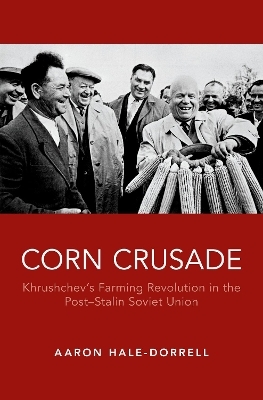
Corn Crusade
Khrushchev's Farming Revolution in the Post-Stalin Soviet Union
Seiten
2018
Oxford University Press Inc (Verlag)
978-0-19-064467-3 (ISBN)
Oxford University Press Inc (Verlag)
978-0-19-064467-3 (ISBN)
Corn Crusade: Khrushchev's Farming Revolution in the Post-Stalin Soviet Union is the first history of Nikita Khrushchev's venture to improve living standards by making the his country a major producer of corn. Lasting from 1953 until 1964, this crusade was an emblematic component of his efforts to resolve agrarian crises inherited from Iosif Stalin.
Corn Crusade: Khrushchev's Farming Revolution in the Post-Stalin Soviet Union is the first history of Nikita Khrushchev's venture to cover the Soviet Union in corn, a crop common globally but hitherto rare in his country. Lasting from 1953 until 1964, this crusade was an emblematic component of his efforts to resolve agrarian crises inherited from Joseph Stalin. Using policies and propaganda to pressure farms to expand corn plantings tenfold, Khrushchev expected the resulting bounty to feed not people, but the livestock necessary to produce the meat and dairy products required to make good on his frequent pledges that the Soviet Union was soon to "catch up to and surpass America." This promised to enrich citizens' hitherto monotonous diets and score a victory in the Cold War, which was partly recast as a "peaceful competition" between communism and capitalism.
Khrushchev's former comrades derided corn as one of his "harebrained schemes" when ousting him in October 1964. Echoing them, scholars have ridiculed it as an "irrational obsession," blaming the failure on climatic conditions. Corn Crusade brings a more complex and revealing history to light. Borrowing technologies from the United States, Khrushchev expected farms in the Soviet Union to increase productivity because he believed that innovations developed under capitalism promised greater returns under socialism. These technologies generated results in many economic, social, and climatic contexts after World War II but fell short in the Soviet Union. Attempting to make agriculture more productive and ameliorate exploitative labor practices established in the 1930s, Khrushchev achieved only partial reform of rural economic life. Enjoying authority over formal policy, Khrushchev stood atop an undisciplined hierarchy of bureaucracies, local authorities, and farmworkers. Weighing competing incentives, they flouted his authority by doing enough to avoid penalties, but too little to produce even modest harvests of corn, let alone the bumper crops the leader envisioned.
Corn Crusade: Khrushchev's Farming Revolution in the Post-Stalin Soviet Union is the first history of Nikita Khrushchev's venture to cover the Soviet Union in corn, a crop common globally but hitherto rare in his country. Lasting from 1953 until 1964, this crusade was an emblematic component of his efforts to resolve agrarian crises inherited from Joseph Stalin. Using policies and propaganda to pressure farms to expand corn plantings tenfold, Khrushchev expected the resulting bounty to feed not people, but the livestock necessary to produce the meat and dairy products required to make good on his frequent pledges that the Soviet Union was soon to "catch up to and surpass America." This promised to enrich citizens' hitherto monotonous diets and score a victory in the Cold War, which was partly recast as a "peaceful competition" between communism and capitalism.
Khrushchev's former comrades derided corn as one of his "harebrained schemes" when ousting him in October 1964. Echoing them, scholars have ridiculed it as an "irrational obsession," blaming the failure on climatic conditions. Corn Crusade brings a more complex and revealing history to light. Borrowing technologies from the United States, Khrushchev expected farms in the Soviet Union to increase productivity because he believed that innovations developed under capitalism promised greater returns under socialism. These technologies generated results in many economic, social, and climatic contexts after World War II but fell short in the Soviet Union. Attempting to make agriculture more productive and ameliorate exploitative labor practices established in the 1930s, Khrushchev achieved only partial reform of rural economic life. Enjoying authority over formal policy, Khrushchev stood atop an undisciplined hierarchy of bureaucracies, local authorities, and farmworkers. Weighing competing incentives, they flouted his authority by doing enough to avoid penalties, but too little to produce even modest harvests of corn, let alone the bumper crops the leader envisioned.
Aaron Hale-Dorrell is a visiting lecturer at the University of North Carolina at Chapel Hill, where he received his PhD in 2014. A native of the Corn Belt, he developed an interest in Russian culture and history during a visit to St. Petersburg as an undergraduate at Indiana University at Bloomington.
Prologue
Acknowledgments
Introduction
1. Scarcely Making Ends Meet
2. Industrial Agriculture, the Logic of Corn
3. Corn Politics
4. Better Living through Corn
5. Growing Corn, Raising Citizens
6. From Kolkhoznik to Wage Earner
7. American Technology, Soviet Practice
8. Battles over Corn
Conclusion
Glossary
Notes
Bibliography
Index
| Erscheinungsdatum | 21.11.2018 |
|---|---|
| Zusatzinfo | 14 halftones |
| Verlagsort | New York |
| Sprache | englisch |
| Maße | 236 x 163 mm |
| Gewicht | 635 g |
| Themenwelt | Geisteswissenschaften ► Archäologie |
| Geschichte ► Allgemeine Geschichte ► Zeitgeschichte | |
| Geisteswissenschaften ► Geschichte ► Regional- / Ländergeschichte | |
| Weitere Fachgebiete ► Land- / Forstwirtschaft / Fischerei | |
| ISBN-10 | 0-19-064467-2 / 0190644672 |
| ISBN-13 | 978-0-19-064467-3 / 9780190644673 |
| Zustand | Neuware |
| Haben Sie eine Frage zum Produkt? |
Mehr entdecken
aus dem Bereich
aus dem Bereich
Gewalt, Umwelt, Identität, Methode
Buch | Softcover (2024)
Spector Books OHG (Verlag)
CHF 49,95
wie Freud im Kollektiv verschwand
Buch | Hardcover (2024)
Klett-Cotta (Verlag)
CHF 34,95


